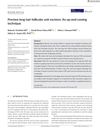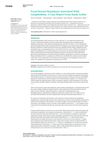 7 citations,
November 2013 in “Pediatric and Developmental Pathology”
7 citations,
November 2013 in “Pediatric and Developmental Pathology” Over half of the children had abnormal hair under a microscope, with many having genetic hair conditions.
 6 citations,
April 2013 in “Current Dermatology Reports”
6 citations,
April 2013 in “Current Dermatology Reports” Dermatologists are crucial for managing skin side effects in metastatic melanoma patients using vemurafenib and ipilimumab.
 5 citations,
April 2013 in “Nasza Dermatologia Online”
5 citations,
April 2013 in “Nasza Dermatologia Online” Oral zinc therapy is effective for treating acrodermatitis enteropathica.
 5 citations,
August 2003 in “British Journal of Dermatology”
5 citations,
August 2003 in “British Journal of Dermatology” Iron deficiency might contribute to hair loss in women.
 4 citations,
August 2013 in “Case reports in dermatology”
4 citations,
August 2013 in “Case reports in dermatology” A patient with total hair loss developed vitiligo after using a treatment called DCP.
 3 citations,
February 2021 in “Journal of Cosmetic Dermatology”
3 citations,
February 2021 in “Journal of Cosmetic Dermatology” Long hair FUE, a hair transplant without shaving, is becoming more popular and surgeons should learn it.
 3 citations,
November 2018 in “Oncology issues”
3 citations,
November 2018 in “Oncology issues” Cancer survivors often experience worse skin problems from treatment than expected, and working with dermatologists could help improve their condition.
 3 citations,
September 2000 in “Geriatric nursing”
3 citations,
September 2000 in “Geriatric nursing” Aging men face unique health issues like erectile dysfunction, prostate problems, and baldness.
 2 citations,
June 2019 in “Facial Plastic Surgery”
2 citations,
June 2019 in “Facial Plastic Surgery” Medical tattooing improves appearance and quality of life, but has potential risks.
 2 citations,
January 2017 in “Przegla̧d dermatologiczny”
2 citations,
January 2017 in “Przegla̧d dermatologiczny” Two trichoscopic patterns found in hair loss: diffuse fibrotic and androgenetic alopecia, affecting treatment choice and regrowth chances.
 2 citations,
November 2015 in “Actas Dermo-Sifiliográficas”
2 citations,
November 2015 in “Actas Dermo-Sifiliográficas” The document suggests a possible link between mast cells and scarring alopecia, recommending more research for potential treatments.
 2 citations,
March 2015 in “Expert opinion on orphan drugs”
2 citations,
March 2015 in “Expert opinion on orphan drugs” New treatments for hair loss show promise but need more research to confirm safety and effectiveness.
 2 citations,
January 2014 in “Springer eBooks”
2 citations,
January 2014 in “Springer eBooks” The book details skin conditions in older adults, their link to mental health, cancer treatment importance, hair loss remedies, and managing autoimmune and itchy skin.
 1 citations,
September 2023 in “Journal of drugs in dermatology”
1 citations,
September 2023 in “Journal of drugs in dermatology” Alopecia areata causes unpredictable hair loss and emotional distress, with no cure and limited treatment options.
 1 citations,
June 2021 in “International Journal of Dermatology”
1 citations,
June 2021 in “International Journal of Dermatology” People with alopecia areata had lower vitamin D levels, but these levels didn't relate to many aspects of the condition.
 1 citations,
August 2018 in “bioRxiv (Cold Spring Harbor Laboratory)”
1 citations,
August 2018 in “bioRxiv (Cold Spring Harbor Laboratory)” A new mutation in the TMEM173 gene and a risk allele in IFIH1 cause a unique set of immune-related symptoms.

Hair transplants are effective for male and female pattern baldness, have evolved in technique, and require careful planning for natural results and managing complications.
 1 citations,
January 2017 in “International Journal of Dermoscopy”
1 citations,
January 2017 in “International Journal of Dermoscopy” Dermoscopy is useful for identifying and tracking different types of hair loss without scarring.
 1 citations,
September 2015 in “Serbian Journal of Dermatology and Venereology/Serbian Journal of Dermatology and Venerology”
1 citations,
September 2015 in “Serbian Journal of Dermatology and Venereology/Serbian Journal of Dermatology and Venerology” A 19-year-old male had two rare skin conditions causing scarring and permanent hair loss.
 1 citations,
October 2014 in “Paediatrics and Child Health”
1 citations,
October 2014 in “Paediatrics and Child Health” The document concludes that proper diagnosis and management of hair loss in children require a detailed examination and understanding of various hair disorders.
 1 citations,
January 2014 in “Hair therapy & transplantation”
1 citations,
January 2014 in “Hair therapy & transplantation” Platelet-rich plasma treatment is not very effective for chronic severe alopecia areata.
 1 citations,
October 2013 in “Expert Review of Dermatology”
1 citations,
October 2013 in “Expert Review of Dermatology” Diagnosing alopecia areata is challenging and requires careful examination and various tests to distinguish it from other hair loss types.
 1 citations,
September 2013 in “Elsevier eBooks”
1 citations,
September 2013 in “Elsevier eBooks” Hair ages and thins due to factors like inflammation and stress, and treatments like antioxidants and hormones might improve hair health.
 December 2024 in “Cureus”
December 2024 in “Cureus” Baricitinib treatment for alopecia universalis can cause hair regrowth with unexpected whitening.
 April 2024 in “Academic dermatology”
April 2024 in “Academic dermatology” Dermatologists should carefully manage hair loss in cancer patients to improve their quality of life.
 July 2023 in “The Egyptian Journal of Hospital Medicine ”
July 2023 in “The Egyptian Journal of Hospital Medicine ” The conclusion is that emotional support and a variety of treatments are important for alopecia areata, but more research is needed.
 June 2023 in “Dermatology and therapy”
June 2023 in “Dermatology and therapy” The Middle East and Africa need better data, treatment consensus, and support for Alopecia Areata.

A 12-year-old girl in Saudi Arabia with Focal dermal hypoplasia showed skin and dental symptoms, highlighting the condition's variability and the need for personalized treatment.
 March 2023 in “Journal of clinical review & case reports”
March 2023 in “Journal of clinical review & case reports” Frontal Fibrosing Alopecia mainly affects postmenopausal Mexican women, requiring early detection to prevent permanent hair loss.

Researchers found a genetic link for hereditary hair loss but need more analysis to identify the exact gene.






























